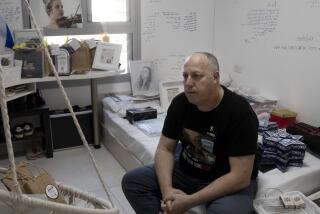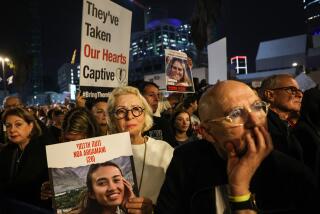Killers Set Terms, a Mother Chooses
BESLAN, Russia — Zalina Dzandarova cradles her son Alan as he sleeps with his small face buried against her stomach. He is the child Dzandarova was able to save. The child she chose to save, really.
It is the other one, little Alana, her 6-year-old daughter, whose image torments her: Alana clutching her hand, Alana crying and calling after her. Alana’s sobs disappearing into the distance as Dzandarova walked out of Middle School No. 1 here Thursday, clutching 2-year-old Alan in her arms.
Guerrillas armed with automatic rifles and explosive belts who are holding hundreds of hostages at the small provincial school in southern Russia allowed 26 women and children to leave. About a dozen mothers, like Dzandarova, were allowed to take only one child, forced to leave another behind.
“I didn’t want to make this choice,” a stunned-looking Dzandarova, 27, said in the reception room of her father-in-law’s house a few miles from the school. “People say they are happy that my son and I are saved. But how can I be happy if my daughter’s still inside there?”
Violence often selects its victims randomly, but seldom is a mother asked to make a Sophie’s choice: Save one child and leave behind another, possibly to face death. The standoff in North Ossetia republic involving about 20 guerrillas -- most likely linked to the neighboring separatist republic of Chechnya or adjacent Ingushetia -- has stunned a nation accustomed to war and its horrors after the many ethnic and territorial conflicts that accompanied the breakup of the Soviet Union.
Even with the downing of two Russian jetliners and two street bombings coming in just one week, the thought of schoolchildren surrounded by veiled female suicide bombers and masked guerrillas has traumatized the country. “They Have Taken Hundreds of Our Children,” read a banner headline in the daily newspaper Izvestia.
And they took Alana.
“They said they would let us go only after the [Russian] troops are withdrawn from Chechnya,” said Dzandarova. She said the attackers had identified themselves as Chechens. “I said we have nothing to do with that, but they wouldn’t listen.”
Her description provided one of the first accounts of what was happening inside the school, where Dzandarova said as many as 1,000 children and parents were being held in a gymnasium planted with explosives. Authorities officially listed the number of hostages at 354, a figure Dzandarova disputed.
“The director of the school was taken to a TV where they were saying there were 354 of us in here, and the director came back and she was in a state of shock, because there were in fact many more people there,” she said.
“There were definitely 1,000 people in that one room,” she said, referring to the gym. “I saw it with my own eyes.”
On Wednesday, Dzandarova took her daughter to the first day of first grade. As students and parents began lining up, they saw the attackers sweeping into the school. Dzandarova ran with her children to hide in a classroom, but they were rounded up with the others and taken to the gym.
“Everyone was ordered to sit down, and they began to set up booby-traps around the perimeter, right in front of our eyes. They had lots of guns and explosives with them.”
At first, she said, everyone was allowed to drink water from the tap. But the hostage-takers soon stopped that, she said, because they were angry that officials, including the presidents of North Ossetia and Ingushetia, had not come to meet with them.
Without water, the powdered milk the guerrillas supplied for the children had to be spooned into their mouths.
The gym was sweltering, even after the window panes were broken out.
“They were telling us, ‘Your government is not allowing enough water for your kids.’ ”
In just two days, she said, the problem became acute. “You see, the kids won’t survive these negotiations,” she said. “They’re not getting enough water. What we have to hope is that they’ll survive this night without water.”
At the beginning, 20 men in the gym were led to a different room. On Thursday, Dzandarova said, 10 of the men returned. The hostages presumed that the others were dead.
“They told us that it was ‘your own side’ that had executed them, who had shot them dead,” Dzandarova said.
Two women who had been wearing suicide belts apparently detonated them Wednesday in an adjoining room, she said.
“They left the gym, and all of a sudden we heard two loud explosions. We thought the storming [by Russian police] had begun. But then they told us, ‘Our sisters have won a victory, and there’s no other cause they want to pursue.’ ”
The male guerrillas, she said, “took it calmly.”
Much of the time, she said, the guerrillas appeared tense: running around the room, waving their guns in the hostages’ faces, shouting at them to sit still and stop talking.
When Alan began to cry from hunger, Dzandarova was allowed to join several other mothers in an adjacent room, which had its own water and was several degrees cooler.
After a former local political leader visited the school Thursday, the women in the adjacent room were told there was “good news”: They would be released.
“They said, ‘Pack your things quickly, and take your babies with you,’ ” Dzandarova said.
Shortly after, she learned that she would have to choose between taking her son or her daughter.
Dzandarova had both Alan and Alana with her and made a snap decision to pass Alana to her 16-year-old sister-in-law. But the guerrillas saw through the ruse and refused to allow her to take the older child.
“Alana was clinging to me and holding my hand firmly. But they separated us, and said: ‘You go with the boy. Your sister can stay here with her.’ I cried. I begged them. Alana cried. The women around us wept. One of the Chechens said: ‘If you don’t go now, you don’t go at all. You stay here with your children ... and we will shoot all of you.’ ”
She couldn’t save both of them. She could only die with both of them -- or save one of them and herself.
“I didn’t have time to think what I was doing,” she said. “I pressed Alan even stronger to myself, and I went out, and I heard all the time how my daughter was crying and calling for me behind my back. I thought my heart would break into pieces there and then.”
Dzandarova cried as she talked. Her tears fell on Alan, who was sleeping. Even when his mother shook quietly with sobs as she cradled him, he didn’t awaken.
Times staff writer Sergei L. Loiko in Moscow contributed to this report.
More to Read
Sign up for Essential California
The most important California stories and recommendations in your inbox every morning.
You may occasionally receive promotional content from the Los Angeles Times.










